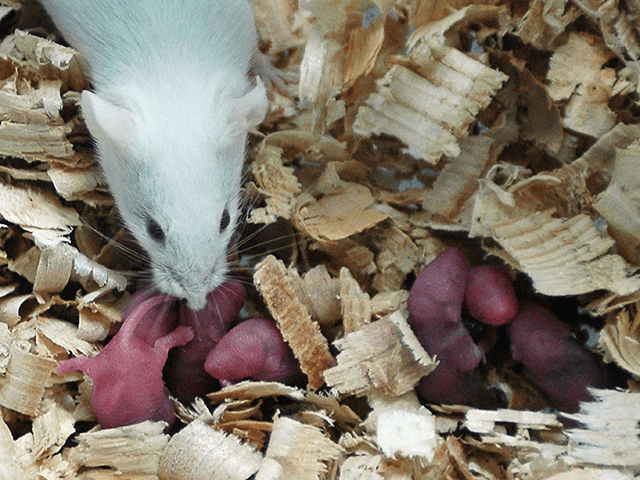A research paper submitted by two Shanghai-based scientists on June 16 described how they were allegedly able to impregnate a male rat and guide it through the delivery of ten healthy cubs.
The paper, currently in pre-publication status and not yet peer-reviewed, is entitled “A Rat Model of Pregnancy in the Male Parabiont.” China’s state-run Global Times summarized how the scientists were able to induce a male rat to give birth:
Male pregnancy is a unique phenomenon in syngnathidae, which refers to embryo or fetus incubation by males. However, whether male mammalian animals have the potential to conceive and get pregnant remains a mystery, said the paper.
First, the scientists conducted a surgery to produce a heterosexual parabiotic pair by joining a castrated male rat and a female one. After eight weeks, uterus transplantation was performed on the male parabiont. Then they transplanted blastocyst-stage embryos to the grafted uterus of the male parabiont and the native uterus of the female parabiont. Later they performed a Caesarean section on embryonic day 21.5, according to the paper.
The success rate of the entire experiment was very low at only 3.68 percent, but 10 cubs were successfully delivered from male parabionts by Caesarean section which grow to adulthood.
A “parabiont” means two organisms fused together so they share a common bloodstream. In other words, the scientists stitched a male and female rat together, kept them alive in that state for eight weeks, and then transplanted a uterus from the female to the male. Once the results of that surgery were stabilized, they moved embryos from the female’s natural uterus to the one implanted in the male.
According to the paper, this process was repeated with 163 pairs of surgically fused rats. Six of the males became pregnant and a total of ten pups were born, surviving into adulthood.
The authors of the paper, Zhang Rongia of Second Military Medical University and Liu Yuhan of Changhai Hospital, anticipated their achievement “may have a profound impact on reproductive biology.”
The South China Morning Post (SCMP) reported Saturday that “heated debate has erupted on the Internet in China” over the experiment. A hashtag related to the paper on Weibo, China’s version of Twitter, swiftly racked up 330 million views.
Most of the feedback appears to be negative, ranging from members of the public who found the experiment horrifying to scientists who questioned the conclusions and methodology of the paper:
“This is against the laws of nature. What is the significance of this kind of research?” one commenter wrote.
“The process is quite cruel. It’s like turning both the male and female rats into incubators,” another person said.
Ge Wei, chair professor of the faculty of health sciences at the University of Macau, said the claim that the researchers had created offspring in males was “totally wrong and misleading.”
Ge went on to explain that even with all of these surgical alterations, the female rat in each parabiontic pair did all of the work, including nursing the embryos until they could survive being extracted and relocated to the surgically implanted uterus in the male rat body.
“The animals they used in the study are actually females although the carriers are a male body. The embryos were obtained from females, developed in the transplanted female’s uterus, and supported by female hormones through the connected circulatory system. This study has little impact on reproductive biology,” he said.
Ge added that while the experiment did not really prove anything about male pregnancy, it could have some helpful ramifications for in vitro fertilization, serving as a proof-of-concept for the possibility of connecting a mother’s body to an external artificial uterus.
Emily McIvor, science policy advisor for People for the Ethical Treatment of Animals (PETA), saw no redeeming qualities in the experiment. She denounced the paper as “vile Frankenscience” to the UK Daily Mail, noting that “rats have nervous systems just like those of humans,” so the test subjects were subjected to incredible torment for no good reason.
“These shocking experiments are driven solely by curiosity and do nothing to further our understanding of the human reproductive system. Animals deserve to be respected and left in peace, not bred in laboratories, experimented on, and treated like disposable objects,” McIvor said.

COMMENTS
Please let us know if you're having issues with commenting.